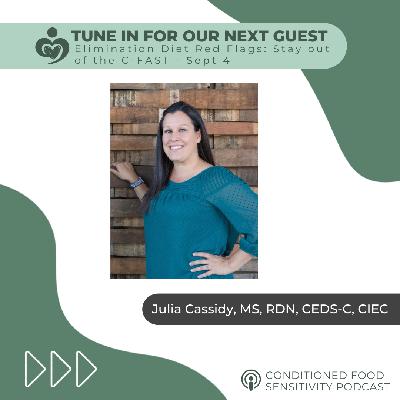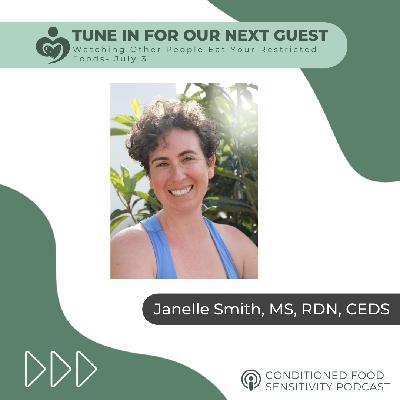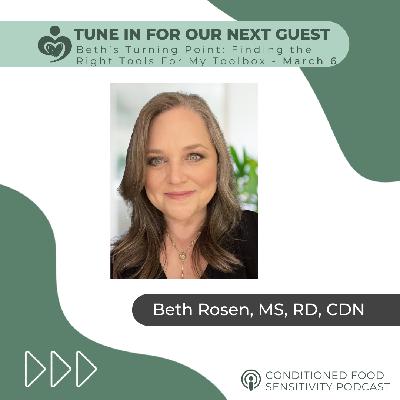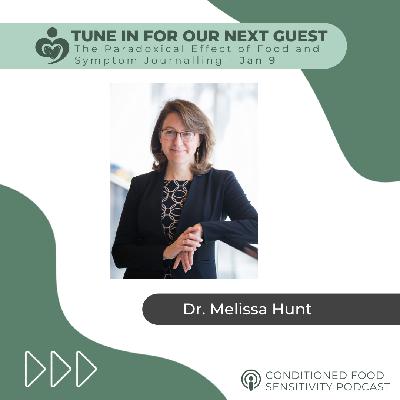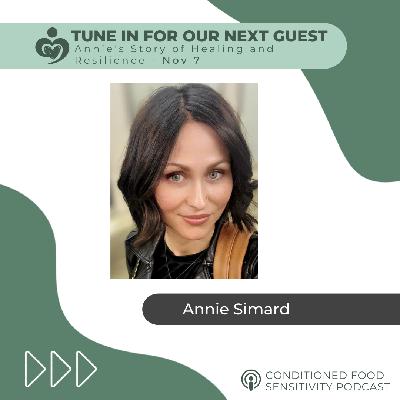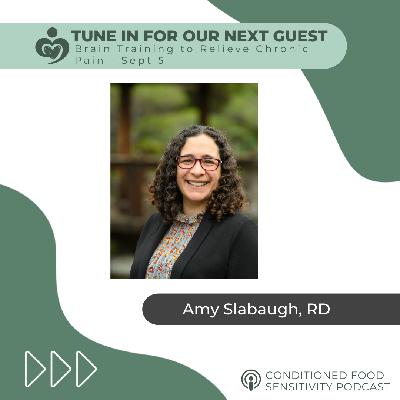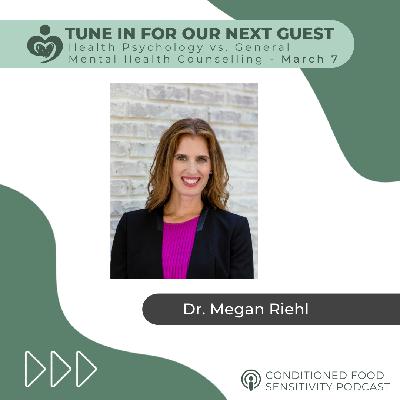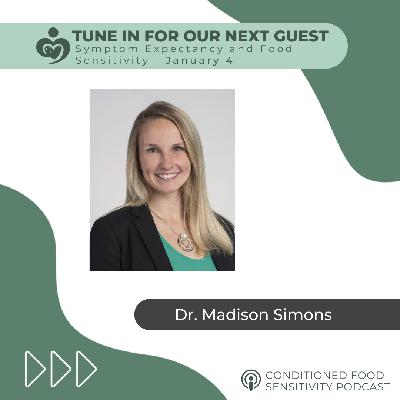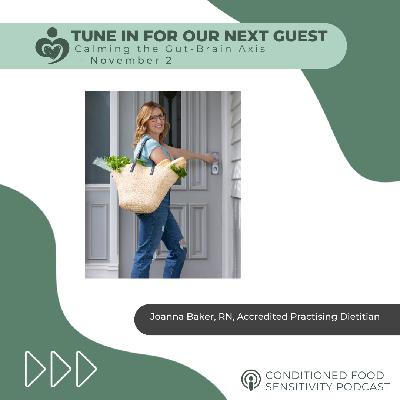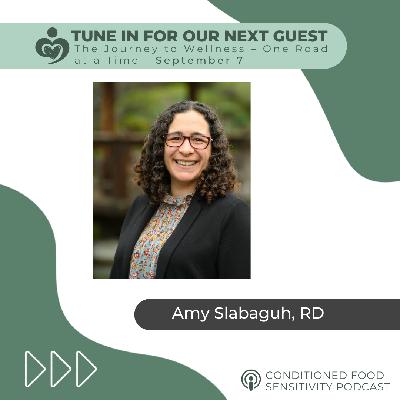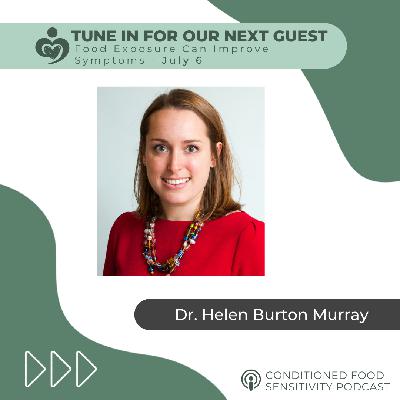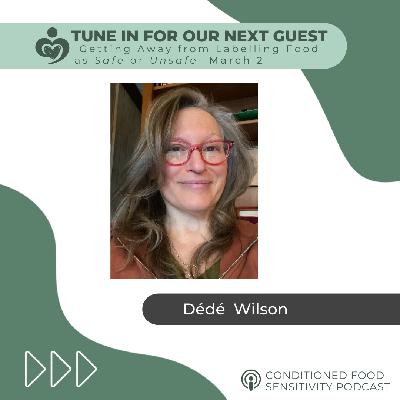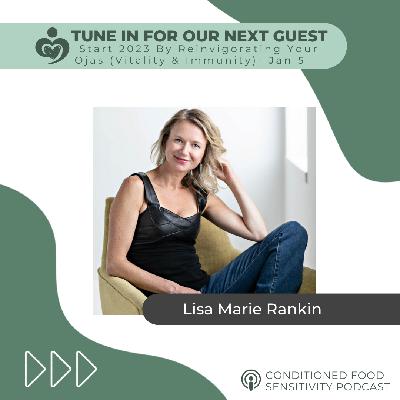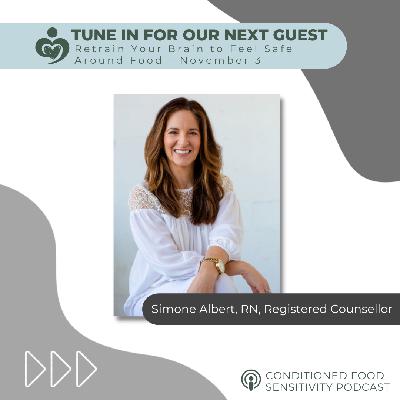Discover Conditioned Food Sensitivity
Conditioned Food Sensitivity

Conditioned Food Sensitivity
Author: Wendy Busse Consulting Ltd.
Subscribed: 14Played: 346Subscribe
Share
Description
Welcome to the Conditioned Food Sensitivity Podcast. My name is Wendy Busse, I am a Registered Dietitian and director of the FAST Freedom Program. FAST stands for the Food Avoidance & Sensitivity Trap. We help people rebuild their body and food trust, so they can break out of the trap, soften their conditioned food sensitivities and expand their diet.
Conditioned food sensitivity is an unconsciously learned, physical reaction to food. Each podcast episode explores practical strategies that will help you look at your food sensitivities from a different perspective and find a better quality of life.
If you would like a written summary of the practical strategies after each episode, you can subscribe on our FAST Freedom Program website.
Conditioned food sensitivity is an unconsciously learned, physical reaction to food. Each podcast episode explores practical strategies that will help you look at your food sensitivities from a different perspective and find a better quality of life.
If you would like a written summary of the practical strategies after each episode, you can subscribe on our FAST Freedom Program website.
58 Episodes
Reverse
A parent/caregiver's food relationship impacts how their child's feeding relationship develops. For example, many children pick up food fear from a parent. Jaclyn shares tips on how to turn these challenges into teachable moments with your child. A parent/caregiver's relationship to food has a direct impact on their child's feeding development. As they develop, children learn from observation and may adopt similar habits or behaviours from the adults around them. For example, a child may not like a food because their parent/caregiver does not like it; this could even transpire into fear of the food altogether. Jaclyn shares tips on how to turn these challenges into teachable moments with your child. Jaclyn Pederson, MHI, is the Chief Executive Officer of Feeding Matters. With more than a decade of experience in program development, Jaclyn Pederson's broad knowledge of programming in the public and social sectors includes program and strategic initiative design, fund development, special events, grant writing, and community engagement. A system thinker and positive team builder, she uses transformational leadership principles to develop energized and efficient workgroups that influence significant organizational and systemic change for all affected by pediatric feeding disorder –such as the development of the expanded PFD Alliance. Jaclyn also manages Feeding Matters' strategic partnerships with numerous professional associations, including the American Speech-Language-Hearing Association (ASHA), the American Society of Parenteral and Enteral Nutrition, and the North American Society for Pediatric Gastroenterology, Hepatology and Nutrition (NASPGHAN). You can reach Jaclyn through her website and social media. https://www.feedingmatters.org https://www.facebook.com/feedingmatters https://www.instagram.com/feedingmatters
Elimination diets are a primary risk factor for getting stuck in the Conditioned Food Avoidance and Sensitivity Trap. Julia Cassidy joined me for an insightful discussion on this topic. She highlights the key warning signs that you may have developed a fearful relationship with food and what to do if you notice these red flags. Julia Cassidy is a highly experienced dietitian with 20 years of dedication to weight-inclusive and nutrition-sensitive care within the behavioral health field. Her leadership roles have included Vice President of Clinical Nutrition and Senior Director of Nutrition and Wellness. She is a Certified Eating Disorder Specialist Consultant, a Certified Intuitive Eating Counselor, certified in Nutrition Psychiatry, and a Licensed Body Positive Facilitator. Listeners can connect with Julia at julscass@me.com or www.thriving-nutrition.net
Watching other people eat foods you are restricting can be challenging. Janelle shares how she has come to a place of acceptance and compassion over the last 15 years of living with celiac disease. Janelle Smith, MS, RDN, CEDS (she/her) is a registered dietitian nutritionist and Certified Eating Disorders Specialist with lived and clinical expertise in supporting a peaceful relationship with food in the midst of gastrointestinal distress. She is passionate about educating other providers about disordered eating and GI diseases, so actively forms and leads initiatives with this mission, including the EDGI Training Project and the Dietitians in Gluten and Gastrointestinal Disorders subgroup with the Academy of Nutrition and Dietetics. She is advancing eating-disorder informed care at her position with UCLA Health Digestive Disease Nutrition Program, speaks on the topic at conferences, and has published multiple peer-reviewed research articles on the overlap. You can reach her at janellesmithnutrition.com and edgitraining.com
Visualization is a powerful tool to rewire our brain's circuitry and create new pathways that lead to success. Visualization can change our relationship with food and help us move past conditioned food avoidance and sensitivity. Aaron Volpatti is a cognitive performance and injury coach, speaker, retired NHL player, burn survivor, and a graduate from Brown University- B.Sc Human Biology. He is also the author of Fighter – Defing the NHL Odds. A pioneer in Cinematic Visualization and athletic performance, Aaron's unique practice has helped athletes all over the world. You can reach him at AaronVolpatti.com
Beth Rosen shares her story of accepting that her digestive discomfort was chronic but also realizing there were many treatments she could explore to get back to a great quality of life. She shares her top tips on travelling this road with persistence and patience. Beth Rosen, MS, RD, CDN, is a weight-inclusive Registered Dietitian specializing in GI nutrition and disordered eating. With 29 years of experience, she runs a virtual practice helping clients manage conditions like IBS, SIBO, and Celiac disease. Beth also educates health professionals through webinars and peer mentoring. Currently the chair of the Dietitians in Gluten and GI Diseases subgroup of the Academy of Nutrition and Dietetics, she's a co-founder of the EDGI Training Project and author of the upcoming book Gut Goals. Learn more at www.BethRosenRD.com.
Food and symptom journalling can be effective when used properly. However, it can also pull you into symptom hypervigilance and the Conditioned Food Avoidance and Sensitivity Trap (C-FAST). Join Wendy and Dr. Melissa Hunt for tips on avoiding these pitfalls. We will also discuss how the brain amplifies sensations in the body and how you can turn the volume down on this communication. Melissa G. Hunt is a licensed clinical psychologist and serves as the Associate Director of Clinical Training in the Department of Psychology at the University of Pennsylvania. She is a Fellow and Diplomate of the Academy of Cognitive Therapy and a member of the Rome Foundation Psychogastroenterology working group. Dr. Hunt conducts research on the best approaches for stress management, and into the causes and treatment of depression, anxiety disorders and chronic GI disorders. As a clinical scientist, her emphasis is on translating basic psychological science into treatments that are effective, acceptable, and accessible to patient populations. Her work focuses on identifying the underlying patient factors (e.g. unhelpful beliefs and maladaptive avoidance) that lead to reduced quality of life, impairment and distress, particularly factors that exacerbate chronic health problems and make them harder to cope with, and on developing and disseminating evidence based, empirically supported treatments for folks with GI disorders. In addition to her research, she maintains an active private practice in clinical psychology in which she specializes in cognitive-behavioral treatment with patients with chronic GI disorders, as well as co-morbid mood, anxiety, obsessive-compulsive, and trauma disorders. She is the author of two evidence-based, empirically supported self-help books that make CBT accessible to patients with IBS and IBDs, as well as an empirically supported treatment manual on CBT for IBD patients. You can reach Dr. Hunt at mhunt@psych.upenn.edu.
Annie shares her story of how the bulimia she developed as a teenager morphed into food sensitivity restrictions while she was enrolled in a "wellness" program. She developed chronic health problems and believed that food was the cause and that a restricted diet was the cure. Annie shares how these restrictions impacted her life and how she broke out of the trap and is now enjoying freedom from food. Annie is a recovered trauma-informed eating disorder mentor and intuitive eating facilitator with a dedicated focus on addressing misinformation in wellness spaces. She connects individuals with vital resources and offers specialized eating disorder recovery coaching, collaborating closely with other treatment providers. Her mission is to guide individuals towards a healthier relationship to food and self, while also equipping them with the skills to navigate and discern accurate information amidst the challenges of misinformation in wellness environments. You can read more about her story here.
Amy Slabaugh is a returning podcast guest. We released an episode in September 2023 talking about her journey with chronic, debilitating headaches and the importance of taking one road at a time (i.e. systematically trialling new treatments). Through this approach, she discovered brain training tools that dramatically improved her quality of life. Amy Slabaugh is a registered dietitian nutritionist specializing in intuitive eating and the dietary management of irritable bowel syndrome (IBS). In her practice, she loves working with people to foster a positive relationship with food and learn to nourish their bodies in a way that promotes health. For those who are experiencing adverse reactions in response to food, her goal is to help clients work toward minimizing their symptoms and improving their quality of life. Providing counseling for clients as they work through the C-FAST Treatment course is a great way to do this. You can reach Amy at AmySlabaugh.com.
Dr. Biesiekierski discusses her groundbreaking research, highlighting the interaction between mind and body in food sensitivity reactions in irritable bowel syndrome (IBS). Her research was a key finding to support IBS (and other conditions) being classified as Disorders of Gut-Brain Interaction (DGBI). Dr. Biesiekierski's research focuses on improving diet management for gastrointestinal disorders (particularly irritable bowel syndrome and functional dyspepsia) through mechanistic insights along the gut-brain axis. She is a researcher and senior lecturer with the Department of Nutrition, Dietetics and Food at Monash University in Australia. You can reach Dr. Biesiekierski through the Monash University website here.
Dr. Laurie Keefer discusses how a flexible, curious and resilient mindset makes food reintroduction easier. She will also share her expertise and practical tips on how to make this change. Dr Laurie Keefer, PhD is a GI Health Psychologist and Professor of Medicine and Psychiatry at the Icahn School of Medicine at Mount Sinai in New York City. She has a more than 20 years of experience in the development and implementation of behavioral therapies for chronic digestive disorders, including Inflammatory Bowel Disease (IBD). She currently directs the GRITT Program, an integrated care model for Crohn's and ulcerative colitis patients within the IBD Center at Mount Sinai Hospital. She maintains a clinical practice focused on psychosocial concerns among medically complex IBD. If you would like help from a GI Psychologist, please visit the GastroPsych section on the Rome Foundation website (access here).
Health psychology focuses on how biological, social and psychological factors influence all aspects of health. However, many people are reluctant to see a health psychologist because the recommendation can sound like, "Your symptoms are in your head" or "Your symptoms are caused by stress; just relax, and you will feel better." This is such a prevalent problem that I wanted to learn more about this field and explore the difference between health psychology and general mental health counselling. We are fortunate to have Dr. Megan Riehl on the podcast today to explain the difference. Dr. Megan Riehl is a GI psychologist who is a key opinion leader in the area of psychogastroenterology. She is an Associate Professor of Medicine and the Clinical Director of GI behavioral health at the University of Michigan. She is also the Director of Behavioral Health Services and Support for GI OnDemand. Dr. Riehl's clinical research focuses on the delivery of GI behavioral health treatment for patients with disorders of the gut-brain and IBD. Dr. Riehl participates on several national committees dedicated to research and education to enhance the psychosocial functioning of patients with gastrointestinal problems. Together with expert GI dietitian Kate Scarlata, she has co-authored a new book for those living with IBS – Mind Your Gut. Mind Your Gut is available in March 2024. Learn more here.
Food sensitivity is rarely a simple cause and effect. Biological and psychological factors interplay to produce symptoms. We will talk about the role of symptom expectancy (i.e., nocebo response) in exacerbating symptom severity and how minimizing expectancy can dramatically improve quality of life. Dr. Simons is a GI psychologist in the Digestive Disease and Surgery Institute at the Cleveland Clinic and specializes in treating motility related gastrointestinal conditions. She is particularly interested in the precipitants and consequences of dietary modification in digestive disease and the overlap between gynecologic and gastrointestinal conditions. Listeners can contact Dr. Simons via email at simonsm3@ccf.org.
We will discuss how signals between the gut and the brain (gut-brain access) become amplified in irritable bowel syndrome and strategies for calming this communication. The brain similarly communicates with other body parts, so the concepts and strategies apply to symptoms throughout the body. Joanna Baker is a Dietitian & a Nurse who loves food. Her passion for digestive health stems from a long history of living with gut problems. Joanna knows first-hand how debilitating gut problems can be, but also how much better life is when its well managed. At Everyday Nutrition she works with a team of amazing dietitians who love to support people to resolve digestive issues and make peace with food.
When there is no clear treatment path for your symptoms, you may feel lost or confused by the contradicting treatment options. The frustration often leads to not doing anything (being stuck) or jumping from one thing to the next. Amy will talk about her journey exploring one road at a time. Amy Slabaugh is a registered dietitian nutritionist specializing in intuitive eating and the dietary management of irritable bowel syndrome (IBS). In my practice, I love working with people to foster a positive relationship with food and learn to nourish their bodies in a way that promotes health. For those who are experiencing adverse reactions in response to food, my goal is to help you work toward minimizing your symptoms and improving your quality of life. Providing counseling for clients as they work through the FAST Freedom Program is a great way to do this. You can reach Amy at AmySlabaugh.com.
You are probably familiar with the vicious cycle of food avoidance leading to additional sensitivities. Dr. Burton Murray will share her clinical experience, and research showing this cycle can be reversed! She describes avoidant/restrictive food intake disorder (ARFID) and how cognitive behaviour therapy can help patients regain a full quality of life. Dr. Helen Burton Murray is the Director of GI Behavioral Health in the Massachusetts General Hospital Center for Neurointestinal Health. Dr. Burton Murray specializes in psychogastroenterology, specifically in the intersection of gastrointestinal conditions and eating disorders. She has a particular expertise in the treatment of rumination syndrome and avoidant/restrictive food intake disorder. To learn more about the GI behavioural Health clinic at the Massachusetts General Hospital Center for Neurointestinal Health, please call 617-726-5565.
When patients do not have a diagnosis and concrete management plan for their symptoms, they typically feel helpless and out of control. Johannah Ruddy shares her story of working with Dr. Drossman to take charge of her health. Subscribe to receive a summary of the valuable tips after each episode. Get off the elimination diet roller coaster, rebuild your food trust and expand your diet with support from the FAST Freedom Program. Johannah is a doctoral student in the School of Pharmacy & Health Sciences at Campbell University and her research is focused on the impact of stigma in chronic illness and gender based health care inequalities. She is also the Chief Operating Officer and Executive Director of the Rome Foundation. In addition to her professional experience, she is a digestive health patient and patient advocate. Dr. Douglas Drossman is trained in both gastroenterology and psychiatry. He is professor emeritus of medicine and psychiatry at the University of North Carolina, President Emeritus and chief executive officer of the Rome Foundation and president of the center for education and practice of biopsychosocial care and DrossmanCare. Dr. Drossman and Johannah have co-authored two books in their Gut Feelings Series: Disorders of Gut-Brain Interaction and the Patient-Doctor Relationship and The Patient's Story. Personal Accounts of the Illness Journey.
Language around food sensitivities is often black-and-white, and foods get labelled as "safe" or "unsafe." Dédé Wilson and I will talk about the impact of this black-and-white approach. Softening your language can change your relationship with food and make space for freedom. Subscribe to receive a summary of the valuable tips after each episode. Get off the elimination diet roller coaster, rebuild your food trust and expand your diet with support from the FAST Freedom Program. Dédé Wilson, co-founder of the low FODMAP resource website FODMAP Everyday® is a Monash University trained and FODMAP Friendly Accredited FODMAP diet educator, who lives with irritable bowel syndrome herself. She is also a professional recipe developer and author of The Low FODMAP Diet Step-by-Step and devotes her time to helping others learn to THRIVE on the low FODMAP diet. She will help you learn how to become IBS symptom-free - while eating deliciously. You can connect with Dédé through the contact us box on the home page of FODMAP Everyday .
Food and health struggles can drain your body's energy - leaving you feeling weak, helpless and frustrated. Lisa Marie Rankin will share self-care rituals and practices to re-energize and strengthen your ojas. Start 2023 on the right track with Lisa's inspiring tips! Lisa Marie Rankin is an author, teacher, and Ayurvedic wellness coach. She helps women heal their bodies and ignite their feminine power so they can live with health, radiance, and inspiration. Visit her website at LisaMarieRankin.com. Lisa is offering listeners free registration to her Ayurveda Essentials mini-course. You'll learn how to use Ayurveda principles and practices in your everyday life to increase your energy, beat belly bloat, and stress less. You'll also learn your Aryuvedic mind and body type, and get a dinacharya (daily routine) checklist.
When done properly, elimination diets can be extremely beneficial. Unfortunately, most people approach elimination diets haphazardly and jeopardize their long-term physical and mental health. I will discuss my top nine tips for planning and working through systematic diet elimination. With a career spanning 30 years, Wendy has had the privilege of working with and learning from hundreds of food-sensitive clients. Her passion is creating engaging online programs to help clients struggling with restricted eating rebuild their body and food trust and expand their diet. As an expert in food hypersensitivities, Wendy has spoken at many national conferences and has sat on the medical advisory committees of non-profit organizations.
Retraining your brain is a common buzzword these days. But what exactly does it mean and how does it apply to food sensitivities? Simone Albert will share her insights on the overlap between fear and food reactions and how to change these automatic reactions. Simone is the principle counsellor and founder of Food Allergy Counselling in Australia. She's a registered counsellor, registered nurse, author and mum of two teenagers living with allergies. She provides support, guidance and evidence-based strategies and techniques to families and individuals navigating the psychological life transition that comes with a new chronic condition diagnosis. Her book Beyond the Allergy Diagnosis is available through Amazon. It is an exceptionally good book and I would recommend it to anyone living with anaphylactic food allergy.



